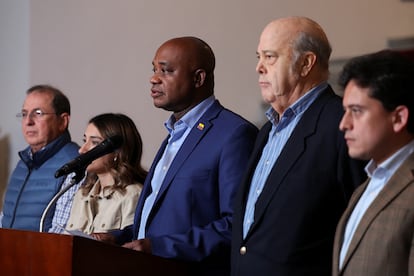Colombia gives in to Trump and will accept deported migrants to avoid tariffs
The president of the United States had threatened Gustavo Petro with a 25% tariff on Colombian products for refusing to allow two planes carrying deportees to land in his country

Colombia gave in to U.S. President Donald Trump’s demands on Sunday night and agreed to accept flights with deportees in exchange for the United States not imposing a 25% tariff on Colombia’s imports. “The government of Colombia has agreed to all of President Trump’s terms, including the unrestricted acceptance of all illegal aliens from Colombia returned from the United States, including on U.S. military aircraft, without limitation or delay,” the White House said in a statement.
According to Washington, the sanctions have been drafted but will remain confidential and unsigned unless “Colombia fails to honor this agreement.”
The Colombian Foreign Ministry released a statement, with a more measured and diplomatic tone than the White House: “We have overcome the impasse with the United States government. In this context, Foreign Minister Luis Gilberto Murillo and Ambassador Daniel García-Peña will travel to Washington in the coming days to hold high-level meetings to follow up on the agreements. These are the result of joint work and the exchange of diplomatic notes between the two governments We will continue to receive Colombians who return as deportees, guaranteeing them dignified conditions as citizens with full rights.”
In recent weeks, Trump had warned that he would impose tariffs on countries as soon as he took office. Canada, Mexico, China, and even the European Union expressed concern over the new U.S. president’s threats as he began his second term. However, on Sunday, Colombia became the first nation to feel the commercial impact of the world’s leading economy. Trump ordered a 25% tariff on all Colombian products, with plans to raise it to 50% within a week. The real estate magnate demonstrated that he will quickly act on his threats. It wasn’t until the last minute that the diplomatic spat was resolved on Sunday.
The episode serves as a stark warning to the rest of the world about the lengths Trump might go to if obstacles are placed in his path to meet his electoral promises to fight illegal immigration. Trump’s actions were triggered by the Colombian government’s decision earlier on Sunday to deny landing rights in Bogotá to two U.S. military planes carrying deported Colombian nationals.
Colombian President Gustavo Petro defended the move, stating that Colombia would not accept deportees until the United States implemented protocols to ensure that immigrants are treated “with dignity and respect.” Angered by this move, Trump retaliated not only with economic sanctions, but also with banking and fiscal restrictions and the revocation of visas for Colombian government officials. Trump also criticized Petro as a “socialist” — a label Petro proudly accepts.
The announcement of the tariffs sent shockwaves through Colombia’s political and financial sectors. However, during an evening meeting on Sunday, government officials appeared confident in their ability to resolve the crisis. “We overcame this crisis today,” a source close to Petro told EL PAÍS.
Petro’s advisors hoped that Trump’s measures would not be enforced, as ultimately turned out to be the case. While the Colombian leader continued his sharp criticism of the U.S. president — going so far as to insinuate that Trump wanted to stage a coup — Foreign Minister Luis Gilberto Murillo and his soon-to-be successor, Laura Sarabia, adopted a more conciliatory approach. The two focused on dialogue and de-escalation as they engaged with the White House to address the conflict.

Colombia has long been a strategic partner for the United States in Latin America. Washington has collaborated with successive Colombian governments in the fight against guerrillas and drug trafficking, providing annual aid of approximately $600 million. Petro, however, has been highly critical of what he perceives as the “servile” attitude of his predecessors.
During a visit to New York for the U.N. General Assembly in 2022, Petro faced sharp criticism for arriving late to a cocktail event organized by Joe Biden, missing the opportunity to greet the then U.S. president. When questioned about the incident, he replied indignantly: “I am not one of those people who are going to chase him into the bathroom.”
Petro blames the White House’s militarized war on drugs for the deaths of hundreds of thousands of people across the continent. He believes the policy was a grave error, arguing that combating drug cartels with force, without a corresponding public health strategy, has been disastrous.
His anti-imperialist stance is rooted in the ideological context of his youth. In the 1980s, Petro was an activist and member of M-19, an urban guerrilla group. But while his biography claims he led a front in the mountains, the reality is that he was never a true combatant.
In his criticism of Trump, Petro has invoked historical figures such as Salvador Allende and Jorge Eliécer Gaitán, two leftist leaders with whom he often draws comparisons. “He can, with his economic power and arrogance, try to stage a coup against me, as they did with Allende. But I stand firm in my beliefs. I survived torture, and I’ll withstand him,” Petro said during an exchange with Trump and his officials. However, at one point that he said he would accept a whiskey to discuss matters more calmly.
If Trump’s had decided to impose tariffs, the economic impact on Colombia would have been severe. A quarter of the country’s exports are destined for the United States, with oil, coffee, and flowers forming the bulk of these exports. Coffee alone accounts for approximately $2 billion in trade, and hundreds of thousands of jobs are tied to these sectors. It is worth noting, however, that Colombia has a trade deficit with the United States.
In response to Trump’s threats, Petro instructed his trade minister to impose a 25% tariff on U.S. imports, vowing to replace these goods with domestically produced alternatives. While the more moderate members of his government advocated for a tempered approach and a swift resolution to prevent further escalation, members of his congressional coalition and several influential commentators urged him to stand firm against Trump.
Brazil and Mexico find themselves in a similarly precarious position regarding repatriations. Both nations are led by leftist presidents: Luiz Inácio Lula da Silva and Claudia Sheinbaum, respectively. During the crisis over electoral fraud in Venezuela, Lula, Sheinbaum, and Petro formed a progressive front in an attempt to broker a compromise solution for Chavismo — though without success. This alliance could potentially resurface as a countermeasure to Trump’s aggressive policies.
Lula allowed a flight carrying Brazilian deportees to land in his country but issued a formal note of protest condemning the treatment they received from U.S. Immigration and Customs Enforcement (ICE). The deportees, he noted, were handcuffed and shackled throughout the flight, a practice he described as humiliating.
Trump has issued a clear warning to those who stand in the way of his anti-immigration policies, a central issue of his election campaign. The exemplary punishment has been directed at Petro, who now finds himself facing one of the most significant crises of his presidency. While Petro’s messages publicly confronted the U.S. president, the feeling is that he has ultimately given in to Trump’s demands.
Sign up for our weekly newsletter to get more English-language news coverage from EL PAÍS USA Edition
Tu suscripción se está usando en otro dispositivo
¿Quieres añadir otro usuario a tu suscripción?
Si continúas leyendo en este dispositivo, no se podrá leer en el otro.
FlechaTu suscripción se está usando en otro dispositivo y solo puedes acceder a EL PAÍS desde un dispositivo a la vez.
Si quieres compartir tu cuenta, cambia tu suscripción a la modalidad Premium, así podrás añadir otro usuario. Cada uno accederá con su propia cuenta de email, lo que os permitirá personalizar vuestra experiencia en EL PAÍS.
¿Tienes una suscripción de empresa? Accede aquí para contratar más cuentas.
En el caso de no saber quién está usando tu cuenta, te recomendamos cambiar tu contraseña aquí.
Si decides continuar compartiendo tu cuenta, este mensaje se mostrará en tu dispositivo y en el de la otra persona que está usando tu cuenta de forma indefinida, afectando a tu experiencia de lectura. Puedes consultar aquí los términos y condiciones de la suscripción digital.








































